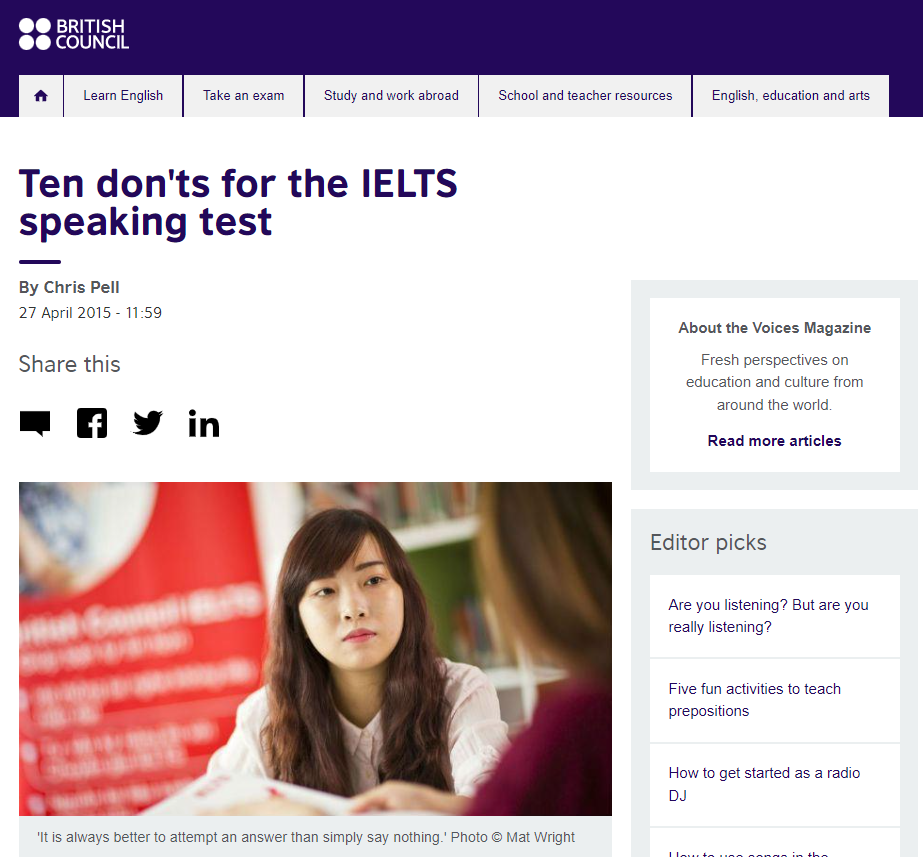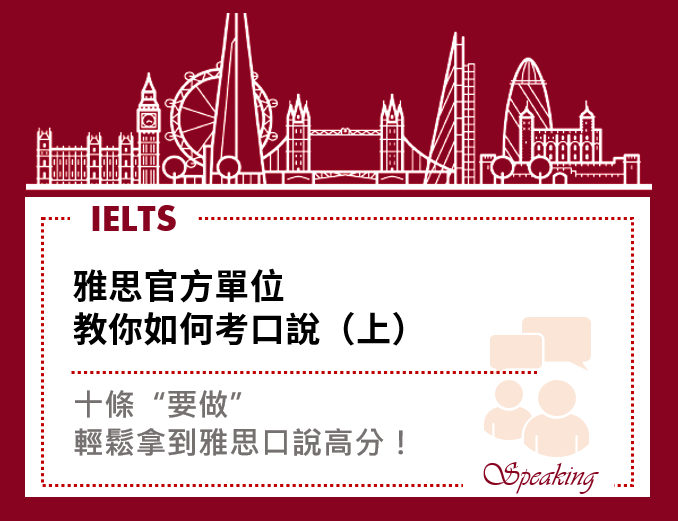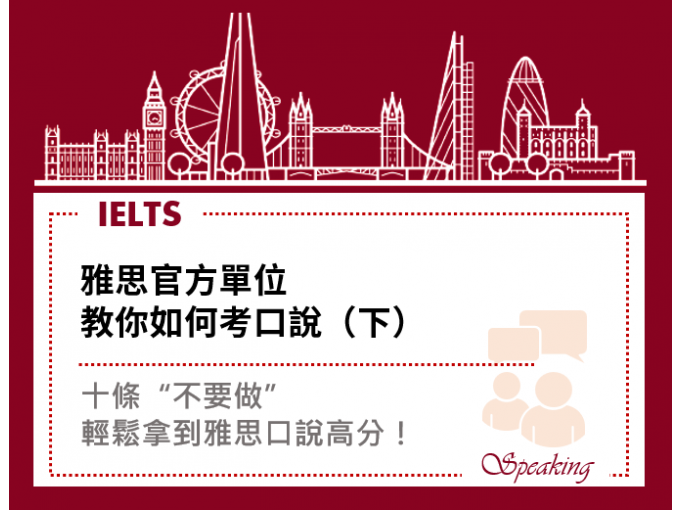在英國文化協會 British Council 的官網上,有非常多關於雅思考試的資訊和評論。其中有兩篇經典文章“Ten dos for the IELTS speaking test”和“Ten don'ts for the IELTS speaking test”完美地回答了雅思考生的各種問題。
這兩篇文章皆來自英國文化協會英語教學獎的老師 Chris Pell,相信大家在看完之後也會對雅思口說測驗有更深刻的認識,更能掌握到精髓。
今天就帶大家看看第一篇「雅思口說“十個不要做"」的內容吧~
雅思官方機構英國文化協會文章出處,請參考:
https://www.britishcouncil.org/voices-magazine/ten-donts-ielts-speaking-test

01 Don’t memorise answers 不要背答案
Lots of people think that the best way to do well in the speaking test is to remember scripted answers and simply use these in the test. This is a bad idea because memorised answers are very obvious and examiners are trained to spot them. You will not only lose marks, the examiners may also ask you more difficult questions to test your English and establish your real level.
許多人認為在口說考試中取得好成績的最好辦法,就是背寫好的答案,然後在考試中直接使用這些答案。但其實這是一個糟糕的辦法,因為背誦的答案是非常明顯的,雅思考官也有經過訓練來識別這些答案。你不僅會因此丟分,考官還可能會問你更難的問題來測試你,從而確定你的真實水準。所以死記硬背全稿不是一個好辦法。
 免費領取雅思程度分析:https://reurl.cc/kyvk1b
免費領取雅思程度分析:https://reurl.cc/kyvk1b
02 Don't worry about the examiner’s opinion 不要擔心考官的看法
I was surprised when some students told me that you can only do well on the speaking test if the examiner agrees with your opinion. Nothing could be further from the truth. Examiners are not concerned with your opinion; they just want you to demonstrate your speaking ability. Focus on giving a fluent answer that responds to the question and is grammatically correct.
我很驚訝於一些學生認為只有考官同意你的觀點,你才能在口說測驗中取得好成績。事實上絕非如此。考官並不關心你的意見,他們只是想你展示你的口說能力,給出一個流利且能回應問題的回答,並且文法正確。
03 Don't insert lots of ‘big’ words 不要加入很多的“大字”
A common misconception is that you must have very long, ‘complicated’ words in every sentence to get a high score on the test. If you listen to how native speakers talk, this just doesn't happen, unless you are at a conference of university professors. You should try to show the examiner that you have a wide-ranging vocabulary, but you should not try to use words you don’t fully understand. If you try to use ‘complicated’ words you don’t fully understand, it is very likely that you will make mistakes and lose marks.
I tell my students to use the 100-per-cent rule: if you are not 100-per-cent sure about the meaning and form of a word, don’t use it.
口說測驗中一個常見的誤解是:你必須在每個句子中都有非常長的、“複雜”的單字才能在考試中獲得高分。如果你聽母語人士的交談,這是不會發生的,除非你是在一個大學教授的會議上。你確實應該向考官展示你的單字量很豐富,但不要使用你不完全理解的單字。如果你試圖使用你不完全理解的“複雜”單字,你很可能會犯錯誤和丟分。我告訴我的學生使用“百分之百規則”:如果你不是百分之百確定一個字的意思和形式,就不要使用它。
04 Don't show off your grammar 不要炫耀你的文法能力
This point is connected to the previous one. Many candidates feel that they need to show the examiner how amazing their grammar is in order to get a high mark. Again, the danger here is trying to use grammar you are not 100-per-cent sure about and then losing control of the sentence. There is no point in using the future perfect continuous tense if it is not appropriate to do so. Think about the tense you need to use when practising, and familiarise yourself with functional language for giving opinions, contrasting views, emphasising, and so on.
這一點與前一點相關。許多考生覺得他們需要向考官展示他們的文法有多棒才能得到高分。再說一次,使用你不是百分之百確定的文法,而導致你不能很好地說出這一句子是很危險的。如果不合適的話,使用未來完成進行式是沒有意義的。想想你在練習時需要使用的時態,熟悉用於表達觀點、對比觀點、強調等等的功能性語言。
 免費領取雅思程度分析:https://reurl.cc/kyvk1b
免費領取雅思程度分析:https://reurl.cc/kyvk1b
05 Don't say nothing 不要什麼都不說
This seems like an obvious piece of advice but you would be surprised by how many students prefer to say nothing rather than attempt to give an answer. It is always better to attempt an answer than simply say nothing. Many students feel this way, perhaps because their old teacher told them to say nothing or criticised them if they didn't know the answer. In the IELTS speaking test, you are not expected to give a perfect response to a question or to be an expert in many different areas. The main thing is to demonstrate your speaking ability.
If you don’t know the answer, it is always acceptable to say something like ‘I don’t have much knowledge of this subject, but I think…’ or ‘I'm not really sure, but if I had to say….’, and attempt an answer.
這似乎是一個顯而易見的建議,但我常常會驚訝有多少學生寧願什麼都不說,也不願嘗試給出答案。試著回答總比什麼都不說要好。許多學生都有這種感覺,也許是因為他們的老師告訴他們,如果他們不知道答案,就什麼都別說。在雅思口說測驗中,你不需要對一個問題做出完美的回答,也不需要成為許多不同領域的專家。最重要的是展示你的口說能力。
如果你不知道答案,可以這樣說:
‘I don’t have much knowledge of this subject, but I think…’
‘I'm not really sure, but if I had to say….’
06 Don't prioritise grammar over fluency 不要讓文法淩駕於流利度之上
In the exam, you get separate marks for grammatical accuracy and fluency. Most students I've taught in Asia worry more about their grammar than their fluency, and the latter skill suffers as a result. When I have taught European students, it is generally the opposite way round. Ask a teacher or native speaker to give you advice about your grammar or fluency needs. You can then focus on improving one or the other.
在考試中,你會在文法準確性和流利度上分別得到單獨的分數。我在亞洲教過的大多數學生都更擔心他們的文法而不是他們的流利程度,結果後者受到了影響。當我教歐洲學生時,情況通常是相反的。向老師或以英語為母語的人請教文法或流利度方面的問題,然後你可以專注於改善其中一個。
07 Don't worry about your accent 不要擔心你的口音
I work at a well-known school with ‘British’ in the title, and lots of students come to me at the end of the first class and ask how they can get a British accent like me. This always makes me smile because I actually have an Irish accent and I ask them which British accent they would like to learn. Many students are overly concerned with sounding more ‘British’ or more ‘American’, whatever this actually means. In fact, accent is not important in the speaking test as long as it does not impede your ability to communicate.
我在一所名字裡有“英國口音”的著名學校工作,很多學生在第一節課結束時來找我,問我怎樣才能學我這樣的英國口音。這總是讓我發笑,因為我其實有愛爾蘭口音,我問他們想學哪種英國口音。許多學生過於關注聽起來更“英國”或更“美國”,不管這實際上意味著什麼。事實上,口音在雅思口說考試中並不重要,只要它不妨礙你的溝通能力。
08 Don't get too nervous 不要太過於緊張
Getting nervous is a natural reaction to a test, but nerves can often bring someone’s score down in a few different ways. Some people have a tendency to speak at a very low volume when they are nervous and this will reduce the examiner’s ability to understand you. Others mumble when they are nervous and this is obviously a bad idea in a speaking test. The key is to prepare properly and then you will feel more confident.
緊張是對考試的一種自然反應,但它通常會在幾個方面降低一個人的分數。有些人在緊張的時候會用很低的音量說話,這會降低考官理解你的能力。還有一些人在緊張的時候說話會含糊不清,這在雅思口說考試中顯然不是一件好事。關鍵在於要做好充分的準備,這樣你才會更加自信。
09 Don't be late 不要遲到
Make sure you give yourself lots of time to get to the examination centre and find out where your speaking test will be. By getting there early you will be able to get comfortable in your surroundings and concentrate solely on the exam. Don’t be afraid to ask the staff any questions you might have; they are there to help.
確保你有充足的時間去考試中心,並找到口試的地點。早點到學校,你就能適應周圍的環境,集中精力應付考試。不要害怕向工作人員提出任何問題,他們就是來幫忙的。
10 Don't rely on the examiner 不要依賴考官
Some students think the speaking examiner will prompt you if you are talking too much or too little, or not speaking loudly enough, or if you are not sticking to the question asked. In fact, the examiner has no duty to do any of these things and she or he will allow you to make mistakes and not tell you. Take control of your own speaking and don’t look to the examiner for cues or help.
一些學生認為雅思口說考官會提示你是否說得太多或太少,說話聲音不夠大,或者你有沒有回應問題。事實上,考官沒有義務去做這些事情,他會允許你犯錯誤,而不會告訴你。控制你自己的口說,不要指望考官提供線索或幫助。
以上就是這篇文章的全部內容了,相信裡面許多個技巧都對大家有所幫助,許多回答也解答了大家的疑惑吧!
 立刻瞭解雅思口說課程資訊:https://reurl.cc/kyvk1b
立刻瞭解雅思口說課程資訊:https://reurl.cc/kyvk1b
.png)

.png)
